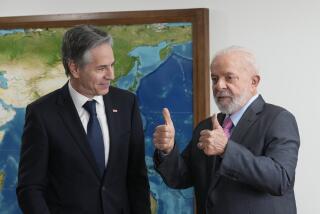Brazil’s New President Starts Dramatic Moves to Squelch Inflation
- Share via
BRASILIA, Brazil — President Fernando Collor de Mello began his second day in office Friday by announcing a drastic cutback in government spending, a temporary freeze on prices and a broad program of other measures aimed at stopping Brazil’s hyperinflation.
The economic package was Collor’s answer to an economic crisis in which inflation has reached explosive rates of more than 70% a month.
“The moment is grave,” Collor declared in a televised speech to his Cabinet and congressional leaders. “Brazil requires that we mobilize for the struggle to overcome the crisis.”
His ambitious program, which took effect immediately but which is subject to congressional approval, calls for a major overhaul of Latin America’s largest economy and the streamlining of the region’s most extensive government apparatus.
Among measures he announced are the suspension of all government subsidies and incentives, more taxes, progressive reduction of import barriers and privatization of many government-run corporations.
Twenty-four government enterprises, agencies, institutes and foundations already have been dissolved by provisional decree, though the functions of some will be absorbed by ministries. Immediately after taking office Thursday, Collor cut the number of ministries from 23 to 12.
In his speech Friday, he said the cornerstone of his anti-inflation plan is the reduction of the government’s size and budget deficit.
Zelia Cardoso de Melo, Collor’s new finance minister, said at an afternoon news conference that government spending--with a previously projected operating deficit equal to 8% of the gross domestic product--will be cut enough to leave a 2% surplus.
“A fiscal reform of this magnitude is unprecedented in the history of Brazil,” Cardoso de Melo said.
Revenue is to be increased by taxing previously untaxed farm profits, capital gains on stocks and liquid assets of corporations, as well as deposits in financial funds.
Cardoso de Melo said that during Collor’s five-year term, authorities hope to remove all non-tariff import barriers, a move aimed partly at exposing protected and inefficient Brazilian industries to international competition.
All subsidies and tax incentives for Brazilian industry and agriculture are to be removed, including those enjoyed by exporters and the fledgling computer industry.
Official price controls will enforce prices prevailing last Monday, rolling back widespread markups made in anticipation of a freeze. Another measure announced by Collor sets jail terms of up to five years for “economic abuse,” including overpricing.
During the next month, some adjustments will be allowed, in order to eliminate distortions in relative prices caused by the hyperinflation. After April 15, monthly price increases will be determined by fixed government goals for a declining inflation rate.
Salaries will be increased at the end of March by February’s inflation rate of 73%. After that, increases will be based on the latest monthly cost-of-living index.
All but small deposits in interest-bearing bank accounts and “overnight” financial funds will be frozen in a measure aimed at shrinking the money supply.
Frozen deposits will not be convertible into a newly created currency, the cruzeiro, except under certain conditions. The cruzeiro replaced the novo cruzado Friday at par value.
BACK TO THE CRUZIERO Brazil’s new president, Fernando Collor de Mello, has launched sweeping economic reforms. Among the provisions: 30-day price freeze.
Currency, called cruzado novo, will be replaced by cruzeiro, name of currency suspended in 1986. Fourth currency in four years, it will be devalued by about 100% vs. cruzado novo.
Steep new income taxes for citizens and corporations.
Suspension of estimated $2.2 billion spent annually in government subsidies to private enterprise.
Stiff increases in public utility rates.
Administrative reform that includes mass dismissal of public employees; federal government has about 700,000 workers.
Disbanding of some government enterprises, including Brazilian Coffee Institute and Institute of Sugar and Alcohol.
lashing of government ministries from 25 to 12.
BRAZIL’S ECONOMY AT A GLANCE
Western world’s eighth largest economy, third largest trade surplus; producer and exporter of computers, cars, aircraft, rockets.
$114-billion foreign debt, Third World’s largest; 2,700% annual inflation, $31-billion budget deficit.
More to Read
Sign up for Essential California
The most important California stories and recommendations in your inbox every morning.
You may occasionally receive promotional content from the Los Angeles Times.













